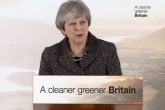DRS will be introduced by 2020, Gove tells MPs
The government hopes to launch a new Environmental Protection Act, which will include legislation for a deposit return scheme (DRS), at the start of the next Parliamentary session in 2019, Environment Secretary Michael Gove has told MPs.
Gove was questioned at a hearing of the cross-party Environmental Audit Committee (EAC) yesterday (18 April), part of the Committee’s inquiry into the aims and ambitions of the government’s 25 Year Environment Plan (25YEP). This followed an oral evidence session on 20 March which gathered information and opinions from environmental charities and academic institutions.
Over two hours, MPs quizzed Gove on specific goals contained in the 25YEP, as well as the reasons for delays on some promised actions. Responding to accusations of delay around the publication of the Resources and Waste Strategy, which was previously pitted for June, Gove stated that “scale and nature of the challenge that we face” is preventing a speedier publication, and that he hopes the strategy will be complete by September.
DRS legislation by 2020

Chair of the EAC Mary Creagh commented: “It is disappointing that having announced the DRS scheme last year, the government will not be bringing this vital part of tackling plastic waste until 2020 at the earliest.”
However, the Committee did welcome the commitment to a new Environment Act, as well as a “strong new environmental oversight body, which we called for in 2017.”
‘Complacency’ around oversight body
On the promised oversight body, intended to hold the government to account on the targets set in the 25YEP, Gove stated that he envisages “five-year reviews” of the Plan, but that he would “like to be in a position where we have at the very least an annual report to Parliament on progress or lack of progress towards some of these goals… There should be an opportunity for the House of Commons ,after any appropriate report from a governance body, to debate and scrutinise the progress we’ve made”. He also stated that an oversight body would need to “emulate or build on the enforcement powers” of the European Commission, including “the capacity to take the government or other relevant body to court.”
However, progress on a consultation on how the oversight body will work has also been subject to delay. Committee member and Green MP Caroline Lucas accused the government of “complacency” after Gove admitted that the recent agreement on a Brexit transition period has reduced the urgency of completing the consultation, which was promised in early 2018. Lucas argued that the body should be developed well before the actual leaving date comes around, while Gove was reticent on this topic, only stating that he “hoped” the consultation would be complete before March 2019.
Also on the topic of leaving the EU, Gove said that a set of environment principles for the UK post-Brexit would not be enshrined in law but would rather be set out in a policy statement, though he was once again vague on the timeline for this; a consultation on the principles may be forthcoming in a matter of weeks.
Common metrics for environmental targets
The Committee frequently returned to the subject of metrics for measuring targets set out in the 25YEP. Gove admitted that “there are hundreds of environmental metrics… We need to have agreement on which metrics are the best by which we can shape government policy.” The government has promised to develop a set of metrics by the end of 2018 to properly chart progress towards its goals, and stated in the 25YEP that it would ‘engage widely over the next six months’ on the subject of metrics.
Criticisms also came from the EAC on the vague nature of targets in the 25YEP, with the use of phrases like ‘soon as is practicable’ coming in place of specific dates and goals. Gove was also pressed for a firmer definition of the term ‘avoidable’ with regard to the Plan’s headline target of eliminating ‘avoidable’ plastic waste by 2042, to which he responded: “This will evolve as technology evolves.”
In addition, questions were raised about how the lack of a solid metrics framework makes it difficult to measure new targets against pre-existing ones. Gove did state that he was fully committed to achieving the environmental goals already in place, including those set out by the EU, and added that a formal comparison of targets would be a useful audit exercise to ensure the UK keeps to existing commitments.
However, he remained vague on when a system of metrics would be agreed upon, and only conceded that more detailed targets would be outlined in the upcoming Resources and Waste Strategy.









